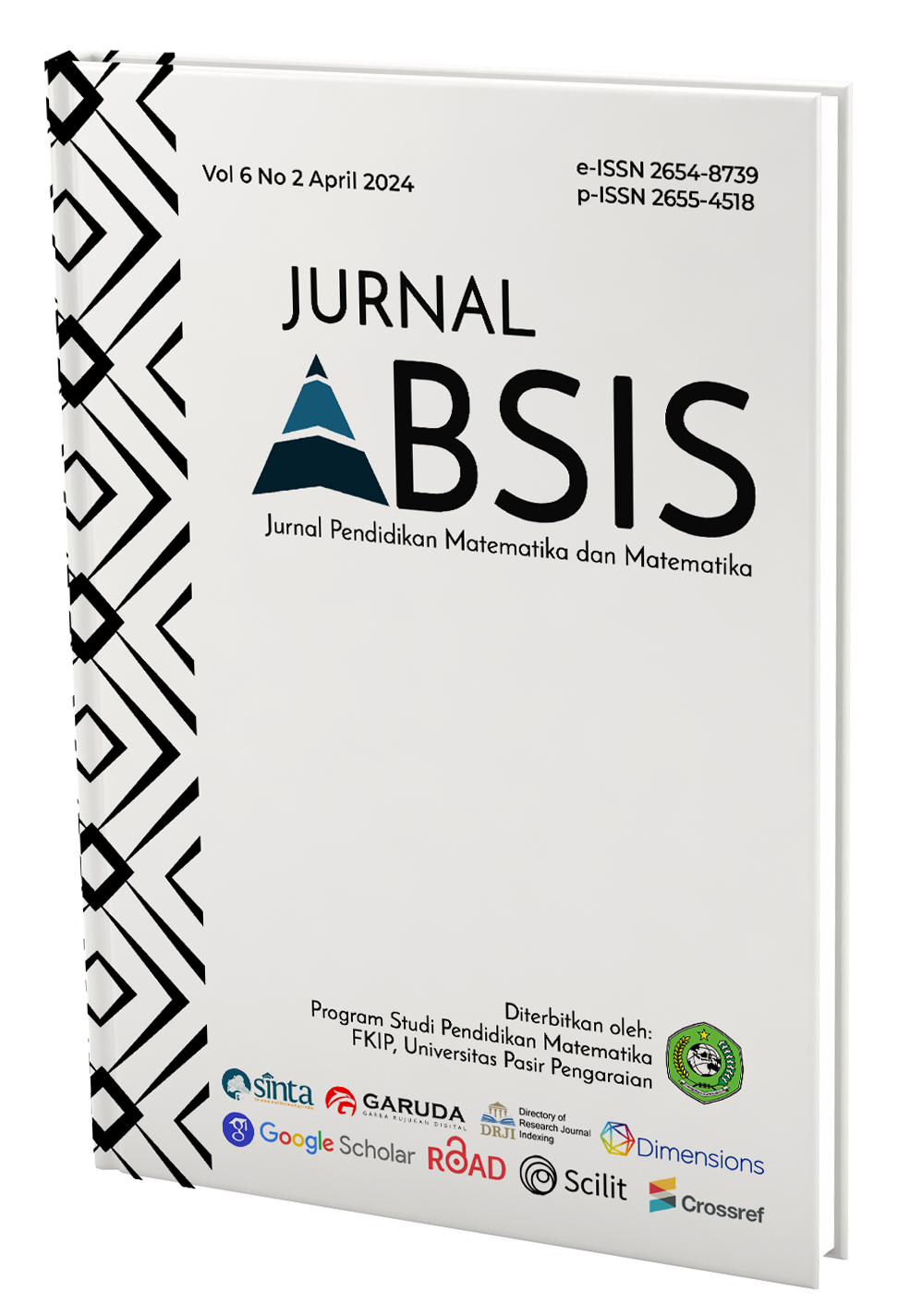Penerapan Model Problem Based Learning untuk Meningkatkan Hasil Belajar Matematika Peserta Didik Kelas VIII MTs Hayatul Islamiyah Pangean
DOI:
https://doi.org/10.30606/absis.v6i2.2283Keywords:
Abstract
This research is motivated by the low mathematics learning outcomes of eighth-grade students at MTs Hayatul Islamiyah Pangean, which are caused by a teaching process that revolves around the teacher. One way to address this is by implementing the Problem-Based Learning model. This type of research is classroom action research that consists of two cycles. Each cycle includes planning, implementation, observation, and reflection. This action was carried out at MTs Hayatul Islamiyah Pangean in the second semester of the 2022/2023 academic year with 20 eighth-grade students. The research instruments used were instructional materials consisting of the syllabus, lesson plans, and student worksheets, while the data collection instruments consisted of observation sheets and student learning outcome tests. Data were analyzed based on the students' observations and mathematics learning outcome tests. The research results show that implementing the Problem-Based Learning model can improve students' mathematics learning outcomes. The average score of mathematics learning outcome tests increased from 55 in cycle I to 90 in cycle II. Thus, applying the Problem-Based Learning model can improve the learning process and enhance the mathematics learning outcomes of eighth-grade students at MTs Hayatul Islamiyah Pangean.
Downloads
References
Arikunto, S. (2007). Penelitian Tindakan Kelas. Jakarta: Bumi Aksara.
Gunawan, I. (2013). Metode Kualitatif (Teori Dan Praktik). Jakarta: Bumi Aksara, Hal 80-83.
Hendra, H. (2018). Peningkatan Hasil Belajar Matematika Siswa Kelas XI IPA SMAN Negeri 1 Bangkinang Melalui Model Pembelajaran Kooperatif Tipe STAD. Jurnal Cendekia : Jurnal Pendidikan Matematika, 2(2), 29–41. https://doi.org/10.31004/cendekia.v2i2.47
Junita, R. D., Solfitri, T., & Siregar, S. N. (2020). Penerapan Model Problem Based Learning (PBL) Untuk Meningkatkan Hasil Belajar Matematika Peserta Didik Kelas VII-A SMP Negeri 40 Pekanbaru. Jurnal Absis: Jurnal Pendidikan Matematika Dan Matematika, 3(1), 230–239. https://doi.org/10.30606/absis.v3i1.570
Klarici, M. J., Saragih, S., & Maimunah. (2020). Implementation of Problem Based Learning Model to Improve the Mathematics Learning Outcomes of Students In Class VII.5 SMP Negeri 4 Pekanbaru. Edumath: Jurnal Program Studi Pendidikan Matematika 12(1), 13-24. https://ejournal.stkipjb.ac.id/index.php/math/article/ view/1946
Kebudayaan, K. P. dan. (2014). Peraturan Menteri Pendidikan dan Kebudayaan Republik Indonesia Nomor 58 tentang Kurikulum 2013 Sekolah Menengah Pertama/ Madrasah Tsanawiyah. 3.
Kemendikbud. (2016). Salinan Permendikbud Nomor 23 tahun 2016 Tentang Standar Penilaian Pendidikan. 2016, (Standar Penilaian Pendidikan), 1–12.
Kurniasih, R. (2017). Penerapan strategi pembelajaran fase belajar model van hiele pada materi bangun ruang sisi datar di SMP Islam Al-Azhaar Tulungagung. Jurnal Silogisme, 2(2), 61–68. 10.24269/js.v2i2.626
Layla, L. (2019). Penerapan Model Pembelajaran Kooperatif Tipe Numbered Heads Together (NHT) untuk Meningkatkan Hasil Belajar Matematika Materi Pecahan Siswa Kelas V SDN 50 Bengkalis Tahun Pelajaran 2018/2019. Jurnal Absis : Jurnal Pendidikan Matematika dan Matematika, 1(2), 62–71. https://doi.org/10.30606/absis.v1i2.89
Murniati, M. (2022). Meningkatkan Kemampuan Membaca Dan Menulis Surah At-Tiin Melalui Model Pembelajaran Problem Based Learning Pada Siswa Kelas V Sdn 017 Buluh Kasab Dumai Timur. Prosiding Pendidikan Profesi Guru Agama Islam (PPGAI), 2(2). 528. https://e-proceedings.iain-palangkaraya.ac.id/index.php/ PPGAI/article/view/1087
Rusman. (2014). Penerapan Pembelajaran Berbasis Masalah. Edutech: Jurnal Teknologi Pendidikan, 1(2), 211–230. https://vm36.upi.edu/index.php/edutech/ article/view/3102
Sari, M. C. P., Mahmudi, M., Kristinawati, K., & Mampouw, H. L. (2023). Peningkatan Kemampuan Representasi Matematis melalui Model Problem Based Learning. PTK: Jurnal Tindakan Kelas, 4(1), 1–17. https://doi.org/10.53624/ptk. v4i1.242
Sary, R.M., Djariyo, & Dewi, I.K. (2015). Model Problem Based Learning Untuk Menumbuhkan Kemampuan Berpikir Kritis Siswa Di Sekolah Dasar. Malih Peddas, 5(2), 302–307. https://doi.org/10.26877/malihpeddas.v5i2.847
Siagian, M. D. (2016). Kemampuan koneksi matematik dalam pembelajaran matematika. MES: Journal of Matematics Education and Science, 2(1), 58–67. https://jurnal.uisu.ac.id/index.php/mesuisu/article/view/117








